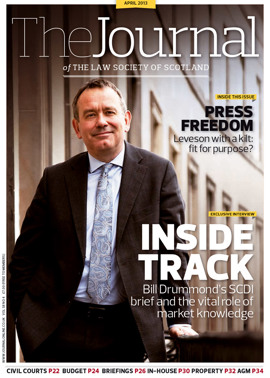McLeveson: still in balance

I have long been an admirer and supporter of the Scottish tradition of intrepid investigative journalism, dogged campaigning, and irreverent comment on the pretensions, evasions and silences of many who are prominent in public affairs. I am also a member of the expert group, chaired by Lord McCluskey, which reported on Leveson in Scotland.
This report has been condemned by journalists, and some media lawyers, as presaging a totalitarian future and as a clear threat to the freedom of the press. How, then, can I square my opening sentence with my endorsement of the substance of the report?
As an initial point to correct certain misunderstandings, our scheme is specifically opposed to registration, or any form of licensing of publishers, compulsory or otherwise. Instead, we favour a system in which no-one need seek a special permit to publish, but all relevant media organs are automatically and indefinitely covered by the specific and limited rules of the Leveson system.
Some may view this as a worse form of compulsion. But what we are talking about here is the everyday “compulsion” of the law, to which most of us, including journalists in matters such as contempt of court, are subject in our work and other activities, by the very nature of what we do. It is normal for legal regulation not to allow opt-ins or opt-outs from the relevant jurisdiction.
So we propose no novel and oppressive regulatory form. What of the substance of our proposals?
The real Leveson
A good place to start is with what Leveson actually proposes. This, like the detail of our attempt to refine its implementation, has received curiously little attention in the heat of recent debate.
Leveson recommended a dual framework for press regulation. First and foremost, there should be a new Regulatory Body, designed and funded by the press itself, strictly independent of government but with some press representation. This body would be responsible “for promoting high standards of journalism and protecting the rights of individuals”; in particular, for avoiding a repetition of the kind of incidents that led to Leveson’s appointment.
A Standards Code would cover the same basic content as the existing Editors’ Code: intrusive investigation, respect for privacy, and reporting accuracy, but providing a fuller complaints, conciliation and remedies procedure than its predecessor.
The focus of the new body would be on ensuring that individual organs of the press have their own adequate and speedy complaint-handling process. But on the occasions, hopefully rare, where that does not suffice, it would have an independent complaint-handling jurisdiction, with power to direct appropriate remedial action, including, as a last resort, the payment of financial sanctions.
Its aim, in short, is not to muzzle the press in its vital tasks, and certainly not to extend the scope of unlawful behaviour, but to provide more effective means to ensure that it does not overstep the mark by the kind of behaviour that the Editors’ Code already roundly condemns.
Leveson also recommended a Recognition Body, with the sole objective of ensuring that the Regulatory Body is fit for purpose, that the relevant self-regulatory mechanisms are in place, and that they cover all significant publishers. Unlike the Regulatory Body, this should be anchored in statute, signalling Parliament’s commitment to the system.
Where McCluskey goes further
We entirely support all of this. We also fully concur that the Recognition Body should be as independent of government and the press as the Regulatory Body itself. Hence our proposal that the appointment of any Scottish Recognition Commissioner, while formally by Scottish ministers, should be overseen by the Scottish Public Appointments Commissioner.
Unlike Leveson, however, we concluded that no significant player should be allowed to opt out of the scheme. Looking to the past experience of the Press Complaints Commission and of similar bodies in Germany and elsewhere, a voluntary system would create perverse incentives. Those not willing to engage from the outset, as well as those who might lose their appetite for engagement, could simply walk away. The Recognition Body, by Leveson’s own criteria, would simply not be able to certify as fit for purpose any Regulatory Body lacking key press organs. A voluntary system, in short, would be a standing invitation to throw a spanner in the works. That view has only been reinforced by the footdragging and backsliding evidenced by London-based media since Leveson, and by the outrage directed at every recent proposal with which the press are not in full agreement.
The other area in which much has been made of our departure from Leveson concerns our proposed definition of the press. Leveson targets all news and periodical publishers, including online. We use the same general approach, in so doing flagging up the difficult question of social media. Here there is a genuine regulatory dilemma, but not one we should run away from.
Clearly not every amateur blogger or tweeter should be subject to complaint and possible sanction. Hard questions have to be addressed about who constitutes a relevant news-related publisher for these purposes. We do not pretend to have a definitive answer to this question, which, as we emphasise in the report, is ultimately one for the legislature (rather than the executive and its royal charter!). There will be difficult cases at the margins, but surely better an approach that looks to purpose and impact rather than form, and which anticipates the future shape of news production and dissemination.
Human rights?
We are accused of riding roughshod over human rights. What we try to do instead, in full compliance with the European Convention, is to find the right balance between different and equally vital rights – the right to freedom of expression and the right to privacy. The new code of practice, echoing the European Convention, will explicitly safeguard the role of the press in exposing crime or impropriety, protecting public health and safety, and preventing the public from being seriously misled. No journalist acting from these purposes, or otherwise in the public interest, will be any more liable to sanction under our proposed system than they are now.
The freedom of the press is so vital that any new regulatory model must be rigorously scrutinised in the round, not least by the press themselves – even as its co-authors. Appointments to the new bodies, the proposed content of the code, and the operation of the Regulatory Body should also be closely monitored. We would expect nothing less.
But in so doing, we must surely acknowledge that we cannot deal in the language of absolutes. The regulation of the press is and always has been about the balancing of different goods rather than the continual reassertion of one. Statutory regulation does not tip the balance towards censorship: look at Denmark, where the press is one of the most robust in Europe. The devil is in the detail of regulation, not its vehicle.
I suggest that our committee has taken seriously the rights of a free press and of private citizens alike and remained committed to finding the right balance. I think all its members, including the two lifelong journalists, pass that test, as do its proposals. We do not believe that they would have prevented the exposure of Keith O’Brien, or the breaking of any of the other recent stories of public interest which we have been accused of seeking to repress.
Leveson remains a valuable piece of analysis, timely, well balanced and, for the most part, realistic in its practical assumptions. In trying to find a way of making it work, I believe we are truer to its underlying purpose than an approach that judges the adequacy of press regulation first and foremost in terms of its acceptability to those whom it is intended to regulate. No one else gets to be judged by that standard.
In this issue
- Fifty shades of lay?
- Employee owners: a view from across the Pond
- All change
- EIAs: increasing the impact
- Mooting comes to Strasbourg
- Reading for pleasure
- Opinion column: Elaine Sutherland
- Book reviews
- Profile
- President's column
- Minimise the risk of rejection
- Helping with enquiries
- Path to growth
- New starts for all?
- Leveson: alarm bells
- McLeveson: still in balance
- From Gill to Bill
- A Budget for aspiration?
- Too far removed?
- Enough to send you to sleep
- Interest on damages: what rate?
- Scottish Solicitors' Discipline Tribunal
- Let's get personal
- Good hedges make good neighbours
- Sep rep: on to the rules
- Ask Ash
- Change management for lobsters
- How not to win business: a guide for professionals
- Keeping errors in check: 2
- Wills at a distance
- Law reform roundup
- Make the survey count






